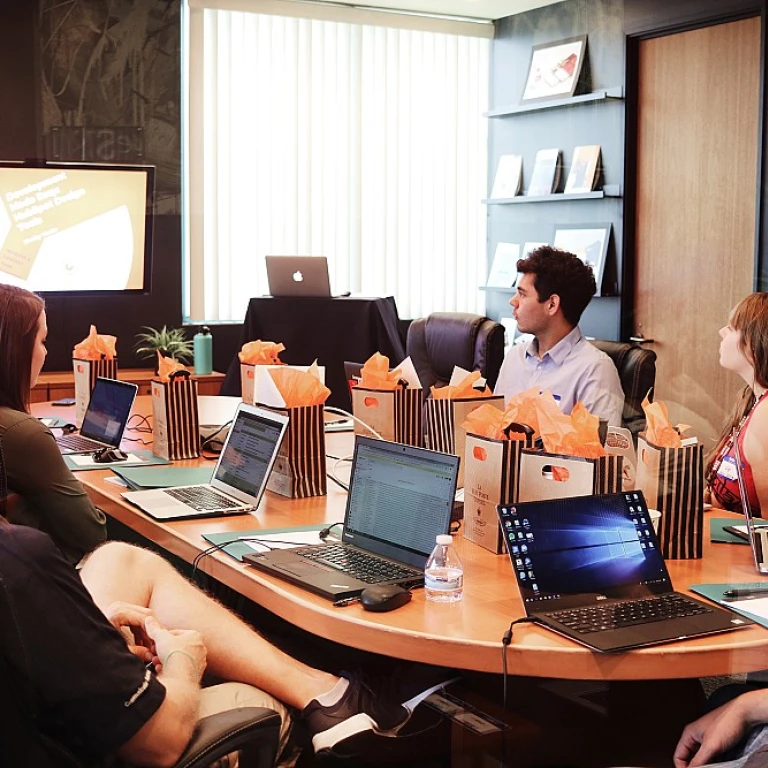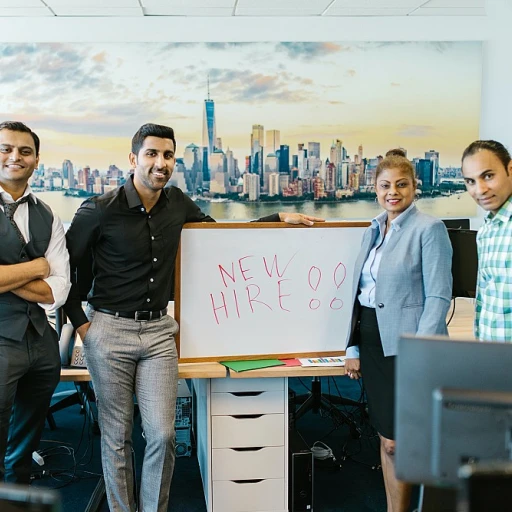
Understanding the concept of hr connectivity
What Does HR Connectivity Mean for Modern Workplaces?
HR connectivity is more than just linking systems or sharing data. It is about building a strong network that connects employees, resources, and business partners in a seamless way. In today’s workplace, human resources professionals are expected to support employees, manage personnel actions, and drive professional development, all while ensuring a positive company culture. This connectivity enables small businesses and large organizations alike to provide customized support, whether through phone, email, or online platforms.
For many small businesses, HR connectivity means having the right tools to manage leaves of absence, track employment opportunities, and foster a sense of connection among team members. It also involves integrating resources for training, customer service, and employee engagement, so that everyone can learn and grow together. The ability to connect with the right resources—be it through a resources network or direct contact connection—can make a significant difference in how employees experience the workplace.
- Access to human resources support via multiple channels, such as phone, email, or online portals
- Streamlined communication between employees and HR teams
- Efficient management of personnel actions and professional development opportunities
- Enhanced company culture through transparent and responsive HR practices
As organizations look to the future, the focus is shifting toward smarter, more connected HR solutions. Businesses in locations like San Diego and beyond are exploring how technology can help them join a broader resources business network, improve employee engagement, and support small businesses in their growth. To learn more about how AI is shaping workforce management and HR connectivity, you can read this insightful article on enhancing workforce management with AI.
The role of artificial intelligence in connecting hr systems
Building a Seamless Network Across HR Systems
Artificial intelligence is reshaping how human resources connect different systems, teams, and processes. In today’s workplace, HR professionals often juggle multiple platforms for personnel actions, employee records, training, and communication. AI-powered solutions help bridge these gaps, creating a more unified resources network that supports both small businesses and larger organizations.
By integrating AI, companies can connect their HR tools—such as payroll, benefits, and leave of absence management—into a single, cohesive network. This means less manual data entry, fewer errors, and faster response times for employees seeking support. For example, when an employee submits a leave request, AI can automatically update their status across all relevant systems, notify the right team members, and even suggest customized training or professional development opportunities during their absence.
- Centralized communication: AI can route inquiries from phone, email, or internal chat to the right HR business partner or customer service representative, improving the employee experience and reducing wait times.
- Smarter connections: AI analyzes data from across the company to identify patterns in employee engagement, training needs, and talent development. This helps HR teams make more informed decisions and offer tailored resources to employees.
- Support for small businesses: Even with limited resources, small businesses can leverage AI to automate routine HR tasks, maintain compliance, and provide a professional level of support to their teams.
For organizations in locations like San Diego or those with remote teams, AI-driven HR connectivity ensures that every employee—regardless of title, location, or business unit—can access the resources they need. This approach not only enhances company culture but also strengthens the connection between employees and the broader resources business network.
To learn more about how AI-driven software is enhancing change management and connectivity in HR, read this in-depth article on AI-driven change management.
Enhancing employee engagement through smarter connectivity
Building Stronger Employee Connections with AI
Artificial intelligence is transforming how human resources teams foster connection and engagement in the workplace. By leveraging AI-powered platforms, organizations can create a more connected network of employees, regardless of their location or role. This is especially valuable for small businesses or teams spread across different regions, such as San Diego or remote offices.
- Customized Communication: AI tools help personalize communication, ensuring employees receive relevant updates via email, phone, or internal platforms. This tailored approach supports better engagement and keeps everyone informed about personnel actions, training opportunities, or leaves of absence.
- Learning and Professional Development: AI-driven learning platforms recommend training and resources based on individual needs and career goals. Employees can join courses, read curated content, and connect with mentors, supporting their professional development and strengthening the company culture.
- Employee Support and Customer Service: Virtual assistants and chatbots provide instant answers to HR-related questions, from benefits to employment opportunities. This improves customer service for employees and frees up human resources professionals to focus on more strategic tasks.
AI also enables smarter talent management by analyzing engagement data and identifying patterns that may indicate a need for additional support or resources. For example, if a team shows signs of disengagement, HR can proactively offer resources or adjust workloads to improve morale and connection.
For organizations looking to streamline their recruitment and onboarding processes, AI-powered solutions can help connect candidates with the right roles and support a seamless transition into the team. To learn more about how AI is shaping applicant tracking and recruitment, read about the future of applicant tracking systems.
Ultimately, AI enhances the human aspect of human resources by supporting a more connected, engaged, and resilient workforce. This not only benefits employees but also strengthens the business as a whole, helping organizations adapt to changing workplace needs and expectations.
Streamlining recruitment and onboarding with connected AI solutions
Smarter Recruitment: Connecting Talent and Teams
Artificial intelligence is transforming how human resources professionals connect with talent and build stronger teams. By integrating AI-powered solutions into recruitment and onboarding processes, businesses can streamline tasks that once required significant manual effort. This shift is especially valuable for small businesses and growing organizations looking to maximize their resources and create a seamless candidate experience.
- Automated Candidate Screening: AI tools can quickly analyze resumes, applications, and even phone email communications to identify the best-fit candidates. This saves time for HR teams and ensures that only qualified applicants move forward, supporting better personnel actions and employment opportunity decisions.
- Customized Onboarding Journeys: With AI, onboarding can be tailored to each new employee. Systems can deliver personalized training modules, connect new hires with relevant resources, and even provide support through chatbots or customer service platforms. This helps employees learn about company culture, professional development opportunities, and workplace expectations from day one.
- Enhanced Communication: AI-driven platforms can facilitate communication between HR, new hires, and managers. Whether it’s through automated emails, reminders about leaves absence, or direct support, these tools help maintain a strong connection throughout the onboarding process.
For human resources professionals, the integration of AI means less time spent on repetitive tasks and more focus on building a connected, engaged workforce. It also allows for better tracking of training progress, easier access to resources, and a more supportive network for both employees and HR teams. In locations like San Diego or across remote teams, this connectivity ensures every employee feels part of the business partner network, regardless of title location or company size.
Ultimately, AI-powered recruitment and onboarding solutions help businesses connect with top talent, foster a supportive workplace, and drive professional growth. As organizations continue to adapt, these tools will play a key role in supporting both small businesses and larger enterprises in their human resource strategies.
Data-driven decision making in hr connectivity
Turning Data into Actionable Insights
Artificial intelligence is transforming how human resources teams make decisions by connecting data from multiple sources across the workplace. Instead of relying on isolated information, AI-powered systems help HR professionals analyze patterns in employee engagement, training participation, and even leaves of absence. This network of connected data supports more accurate personnel actions and helps businesses of all sizes, from small businesses in San Diego to global enterprises, make informed choices that align with company culture and business goals.
Customized Dashboards for Every HR Need
Modern AI solutions offer customized dashboards that allow HR teams to monitor key metrics in real time. These dashboards can display information about employee support requests, professional development progress, and even track the effectiveness of training programs. By connecting data from phone, email, and internal resources networks, HR professionals can quickly identify trends and respond to the needs of employees. This not only improves customer service within the HR department but also strengthens the overall connection between employees and the business partner network.
- Track employee engagement and training outcomes
- Monitor leaves of absence and personnel actions
- Identify employment opportunity gaps and support professional development
- Connect with employees through multiple channels, including phone and email
Supporting Small Businesses and Large Enterprises Alike
Whether you are part of a small business or a larger organization, AI-driven HR connectivity ensures that every team member has access to the resources they need. By leveraging data-driven insights, HR professionals can provide targeted support, recommend relevant training, and foster a culture of learning. This approach helps employees feel more connected to the workplace and encourages them to join initiatives that support their growth and the company’s success.
As the main content of HR connectivity evolves, the ability to learn from data and adapt quickly will remain a key advantage. Businesses that embrace these AI-powered tools are better positioned to support their employees, strengthen their resources network, and drive long-term success in a competitive environment.
Addressing challenges and ethical considerations in AI-powered hr connectivity
Balancing Innovation with Responsibility
Integrating artificial intelligence into human resources brings a new level of connectivity, but it also introduces unique challenges and ethical considerations. As businesses seek to connect their HR systems and support employees with smarter tools, it is essential to ensure that these innovations respect privacy, fairness, and transparency.
Key Challenges in AI-Driven HR Connectivity
- Data Privacy and Security: HR systems handle sensitive employee data, from leaves of absence to personnel actions. AI solutions must protect this information, especially when connecting resources across a network or supporting remote teams. Small businesses and large enterprises alike need robust protocols to safeguard data, whether accessed by phone, email, or internal platforms.
- Bias and Fairness: AI models can unintentionally reinforce existing biases in recruitment, talent management, and professional development. Ensuring that algorithms are regularly audited and trained on diverse datasets helps create a more equitable workplace and supports a positive company culture.
- Transparency and Explainability: Employees and HR professionals should be able to understand how AI-driven decisions are made. Whether it’s about employment opportunities, customized training, or personnel actions, clear communication builds trust and supports a healthy resources network.
Ethical Considerations for Human-Centric AI
- Employee Consent and Autonomy: Employees must be informed about how their data is used and have the option to opt out of certain AI-driven processes. This is especially important in areas like professional development and customized support.
- Supporting Human Connection: While AI can streamline processes and enhance connectivity, it should not replace the human touch in HR. Maintaining strong customer service, open channels for feedback, and opportunities for team connection remain vital for a healthy workplace.
- Continuous Learning and Adaptation: The landscape of AI in HR is evolving. HR professionals, business partners, and small businesses need ongoing training to learn about new tools, ethical standards, and best practices. Joining a resources network or professional association can provide valuable support and up-to-date information.
Practical Steps for Responsible AI Integration
- Establish clear guidelines for data use and privacy across all HR systems.
- Regularly review and update AI models to minimize bias and ensure fairness in employment opportunity decisions.
- Provide transparent communication to employees about how AI impacts their experience, from recruitment to ongoing support.
- Encourage feedback from employees and HR teams to identify areas for improvement and maintain a strong company culture.
By addressing these challenges and ethical considerations, organizations can harness the power of AI to connect resources, support employees, and drive business growth—while keeping human values at the center of their HR strategy.













